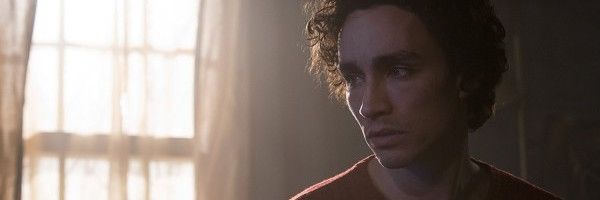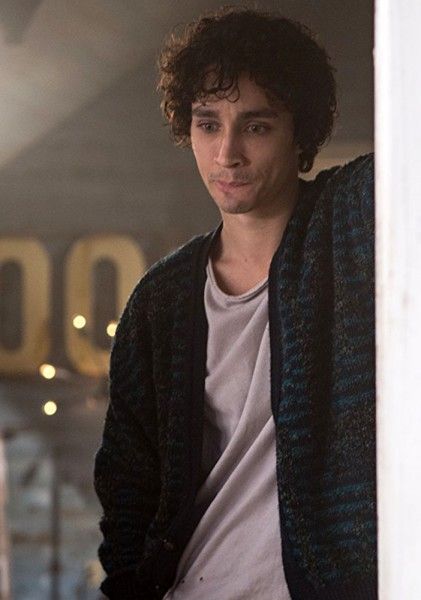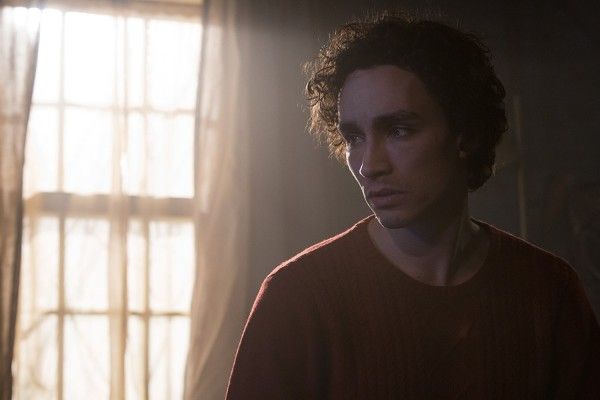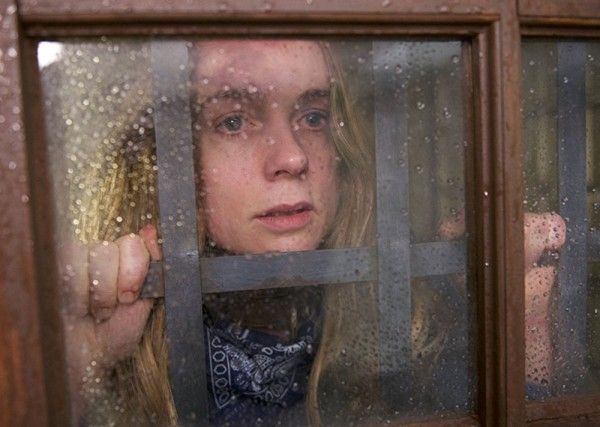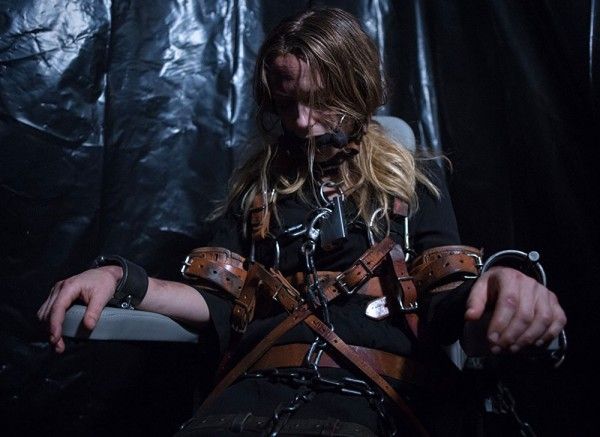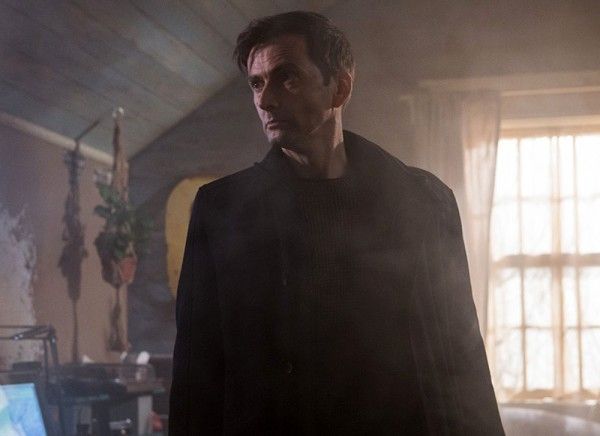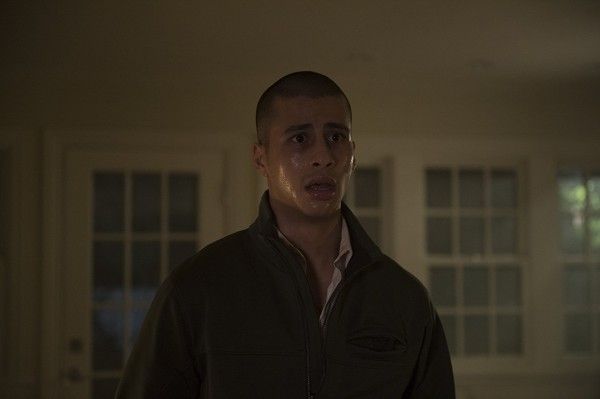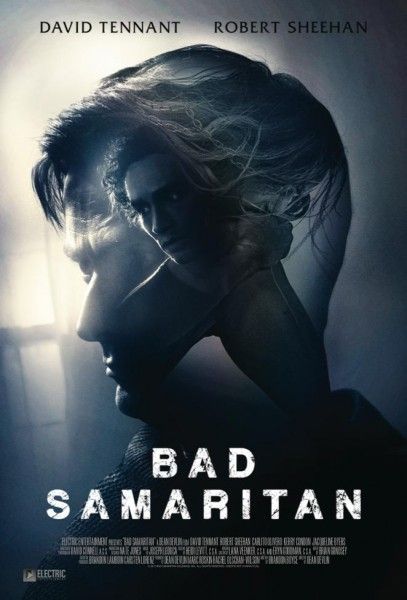From writer Brandon Boyce (Apt Pupil) and director Dean Devlin (Geostorm), the thriller Bad Samaritan follows Sean (Robert Sheehan) who, along with his best friend (Carlito Olivero), is a valet at a local restaurant in Portland, Oregon, where the two men burglarize the houses of customers while they eat. It’s a situation that works for them, until Sean robs the wrong customer – a wealthy man named Cale Erendreich (David Tennant) – and discovers that he’s holding a woman (Kerry Condon) captive and, in order to save her, he must endure the wrath of the kidnapper, who now seeks revenge on him.
At the film’s Los Angeles press day, Collider got the opportunity to sit down with actor Robert Sheehan to chat 1-on-1 about the appeal of Bad Samaritan, the plausibility of this story, why doing a film like this can be like training for a triathlon, the most challenging scenes to shoot, and the vibe director Dean Devlin created on set. He also talked about the Netflix TV series The Umbrella Academy, developing his character Klaus, getting to collaborate with comic creators Gerard Way and Gabriel Ba, and the way they’re shooting the series, as well as what he looks for in a project.
Collider: Was this fun to do, or does it get exhausting to constantly have somebody wanting to kill you?
ROBERT SHEEHAN: It was high octane and physically draining. If someone is training for a triathlon, they feel their muscles burning and their lungs choking, but then, at the end of the day, they get this enormous sense of achievement and satisfaction. I think it can be likened to that, to some degree, because the days were tough and they were long, and I’m pretty much in almost every frame of this film, getting battered and running around, but it was great fun. It was incredibly gratifying, despite the long, cold nights.
Did you know what you were getting yourself into, when you signed on?
SHEEHAN: No, but I always have a bit hubristic and delusional approach to starting a job. I’ll have a laissez-faire, delusional attitude of, “Eh, it’ll be fine!,” which is helpful because it means I’m probably not daunted by things as much. But with this, I wasn’t ready for the extremity of the shoot.
What was the appeal of this project for you? What was it about the script that drew you in?
SHEEHAN: It was the plausibility of it all. I think there’s a lot of fear in that. Me and David [Tennant] were doing an interview together and we were asked about our favorite horror/thriller type movies, and one of them that springs to mind is Funny Games. You can almost liken Bad Samaritan to Funny Games because it’s that theme of horror just down the street in your neighborhood. And actually, (screenwriter) Brandon Boyce’s other film, Apt Pupil, is a good example of that, too. You’ve got this Nazi war criminal living just four doors down. That was something that affected me, quite viscerally. The script was a real fuckin’ page turner, which never hurts. It was hard to put down, and that’s a lot to say about a script because scripts can be tough to read, even good ones. When you anchor the character very much in reality, as a young, naive, morally dubious young lad who makes mistakes, the audience can liken themselves much more to him and go along on the journey because he’s just a flawed individual in a shocking mess, who’s trying to figure out. It inspires the question of, what would you do, much more. With supernatural type of movies, if they’re not done correctly, there are a lot of actors just running and screaming and looking scared for an hour and forty, and that can get a bit old.
There are a lot of intense, dark moments in this, including having a woman tied to a chair and gagged. Were there any scenes that were particularly challenging, for you?
SHEEHAN: Yeah, it wasn’t very pleasant to see poor old Kerry Condon like that. That scene where I first discover Kerry, and then I have to put the gag back in her mouth, I just felt that bodily guilt thing that you feel. She was like, “It’s fine. It’s fine, honestly.” There was very little acting required there. I was daunted about putting the gag back in her mouth. The stuff at the end was challenging, as well, because the elements were somewhat against us. They calmed down eventually, but they were very against us, when we first went out on location and into the forests. For that scene between me and David and Kerry, it was really cold. I wanted to feel a bit of pain, because that often helps, so I laid at the back of the cabin for about half-an-hour, or 45 minutes, before we started filming, in the cold and with no jacket. By the time we were filming, I was in quite a bit of distress. That stuff really helps, when you’re trying to get to intense places. There was no shortage of unpredictability, on this shoot.
How did you find working with Dean Devlin? What kind of vibe did he create on set?
SHEEHAN: I think through sheer obsessive positivity, that trickled down, which is helpful. He’s incredibly decisive, which is great. I’ve been in environments where your director gets to a certain level of pressure and starts to become indecisive and starts changing things, and it sends a worry through the atmosphere of everybody, but Dean is completely not that. He’s an incredibly decisive director. He walks into a space and knows exactly how he’s gonna shoot everything, and that’s why we got the film done in such a short period of time. He’s used to shooting telly as well. It was a safe pair of hands.
You’re also doing The Umbrella Academy TV series for Netflix.
SHEEHAN: I’m doing that now, yeah.
I’m very excited about that!
SHEEHAN: Oh, good! That’s good!
I’m a big fan of Gerard Way and his work.
SHEEHAN: He’s an interesting dude. A man of many talents.
What was it about that, that interested you?
SHEEHAN: For me, for that, it was the character and the team of writers. When I signed on, I only had the first episode script, so really you have to put your faith in the writers’ ability to create 10 hours. I’d seen their work before, predominantly on Fargo, the series. I was a huge fan of Fargo. I binge-watched the first two seasons, in a couple of weeks. I loved that series. I thought it was one of the best series I’ve seen in a long while, so that was a big plus. The creator of Fargo was Noah Hawley, and he’s not involved in The Umbrella Academy, but Steve Blackman was his right hand guy, and it’s him and all the same writers, so that was a big plus. And also, the character that I’m playing is somewhat flaky and messy and chaotic, and it’s really fun, tapping into that energy. We had long chats – me and Steve Blackman, the executive producer and showrunner – about collaboration and he was like, “We welcome improvisation, with open arms.” You don’t always get that, especially in television projects, because schedules are so tight and they’re scared of it. But thankfully, they had enough trust and faith in me to be able to play around and mess around. It’s such a creatively fruitful place to go to work. It really is.
How would you describe the tone of the show?
SHEEHAN: That’s a good question! I haven’t seen anything, so it’s really, really hard to know where the tone is. Hopefully, the tone will be somewhere that it’s never been before. I think that’s what you hope. It’s really funny and really desperately tragic, and it’s a really hard one to pull off. So hopefully, the tone will be unique, but the truth is that I don’t know, at the moment. I’ll know when I see something.
How far into it are you, as far as shooting it?
SHEEHAN: We’re on block three, so we’re finishing up Episodes 4 and 5, at the moment. It’s all manner of bonkers! It really is. It’s great!
And you’re working with such a great cast.
SHEEHAN: Did you read the second graphic novel – the one that’s set around Dallas, Texas and the assassination of JFK?
Yes!
SHEEHAN: Hazel and Cha-Cha, who are these two lunatic assassins, come into it, and those two characters feature in our series. Mary J. Blige is one of them, and Cameron Britton is the other. There’s just such great casting. They’re such an odd couple to put together, the pair of them. It’s very interesting casting. Very brave casting, I think.
Did you get to talk to Gerard Way about it, at all? Did you have questions for him?
SHEEHAN: Yeah. He was with us. There was about a week of rehearsals, before we started filming. Then, we went home for Christmas, and then there was another week, where we did read-throughs and stuff. So Gerard and Gabriel Ba, who also created graphic novels, were there. They were around to answer questions, and I had loads of questions about the character. You’re always looking for fuel. You’re always looking for the meat and potatoes of the stuff that drives the character forward, or is the reason why he is the way he is. Gerard was great for all that. He was also not precious, at all, about the characters developing into something else, off the page, which of course they have to do. He was very respectful of that whole process and he was really sweet. After the read-through, he came up with boyish enthusiasm going, “Great Klaus! It’s really good,! I’m so happy!”
He’s like the most unassuming rock star.
SHEEHAN: I know! He really is! He’s this double-life guy, isn’t he? He’s a sweetheart.
So, you’re shooting a couple episodes, at the same time? Is that how you’re shooting it?
SHEEHAN: Yeah, mm-hmm. Although it’s for scheduling reasons, they put two together. We shot the first as a stand-alone, and the tenth will be shot as a stand-alone. The ones in between will be shot in twos.
That’s cool! I’m excited to see it!
SHEEHAN: It’s high intensity. Everybody says this about this stuff, all the time, but this stuff is an incredibly new take on superhero-ness because all of the manifest sci-fi stuff of the show is dealt with through this dysfunctional family filter. It makes for very emotional and very real character building. I have high hopes for it.
At this point in your career, what is it that attracts you to something? Does it start with the script, or is who you’ll be working with also important to you?
SHEEHAN: Both of those things are the things, really. If there’s a director who I admire, or writers who I admire, or actors who I admire, it definitely makes me prick up and go, “Oh, I could get to work with them!” It’s vanity, to some degree, because you think, “These people have made this great stuff, and now I get to be in their stable and do something with them.” That’s always an exciting thought. So, it’s the script, director, actor triangle. Sometimes you get the holy grail of all three, like on Bad Samaritan.
Bad Samaritan opens in theaters on May 4th.

